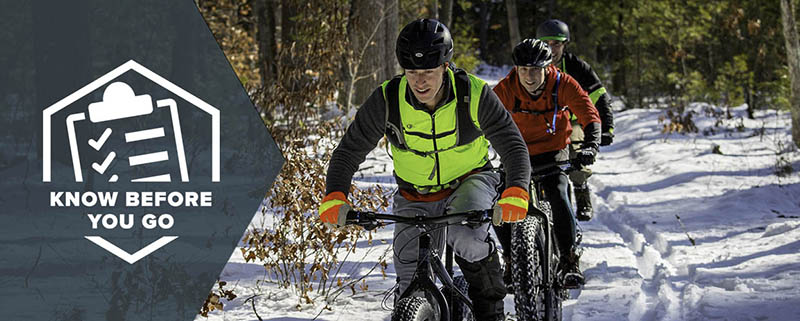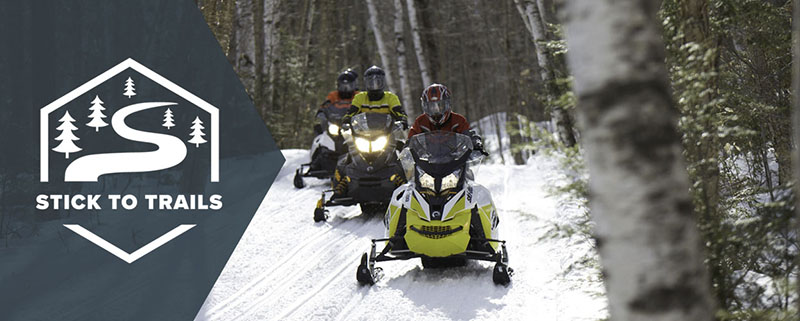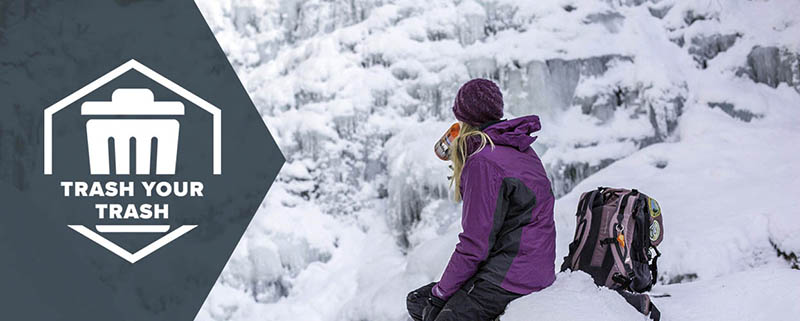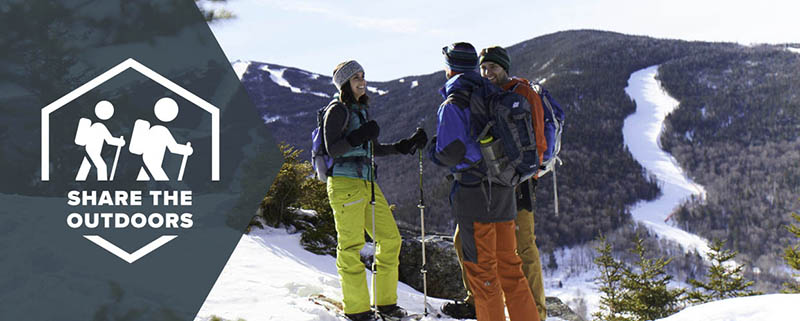The New Hampshire Division of Travel & Tourism Development has partnered with the Leave No Trace Center for Outdoor Ethics to promote sustainable tourism practices and provide visitors and residents with the proper knowledge to protect New Hampshire's spectacular natural landscapes and destinations. Please take a moment to review the principles below to help us protect the great outdoors.

Know Before You Go
There are many different ways to experience New Hampshire’s outdoors. No matter which way you choose, learn about where you’re going ahead of time to ensure a safe and successful adventure. A little pre-planning before you leave home can go a long way to having a more enjoyable experience once you get here.
- Winter in New Hampshire is unpredictable, take steps before you leave home for the best experience possible. Check the weather, road conditions, and trail parking. Be prepared for extreme conditions, the weather in the mountains can change in an instant. Bring extra food, water, and clothes, just in case you run into trouble.
- Parking access for popular trailheads can still be an issue during winter be sure to park safely and legally.
- Consider arriving at your destination during non-peak times
- Avoid parking along the roadsides or on private property
- Have a back up plan, if safe and legal parking is not available
- NH Fish & Game and the White Mountain National Forest offer the hikesafe program to educate hikers on what they should know before they go.
- Trail markers and water hazards are often hidden during the winter. Keep a map and compass handy and know how to use them in case of an emergency.
- It gets dark early! The days are much shorter here during winter. Check the time of sunset before you go. Bring a headlamp along just in case.
- Phone battery power runs out quickly in the cold. Keep your phone in an inside pocket. Bring extra charging capability just in case you need it.
- Snowmobile season begins on December 15 and usually ends in April. Dates vary depending on landowner permissions and weather.
- Be informed about your activity. Whether you’re headed out for a short winter ride, hike or traversing the backcountry:
- ALWAYS check avalanche and weather reports before leaving. The Mount Washington Avalanche Center (MWAS) has the latest backcountry conditions and regularly issues avalanche forecasts, which include safety information and high danger areas. Monitor snow conditions. Carry and use an avalanche beacon, probe and shovel. Know how to use them. These are other resources that can help you when visiting the backcountry.
- Never go alone. Visit the backcountry in small groups and leave your itinerary with family or friends.

Stick to the Designated Trails
Sometimes the path well-traveled is the best path to follow. Prevent injury and reduce damage to plants, trails, and the landscape by sticking to marked paths and campsites.
- Ride, ski, or hike on designated trails. Winter trails help protect you from venturing off into unknown areas with snow-covered water and other hazards you might not be aware of.
- Respect private property. With more than 70% of New Hampshire's land under private ownership, the key to maintaining our access to trails is respecting their property. Travel is allowed on defined paths for a reason, and that is the only place you should be going.
- Off-trail riding damages property. A small ride through a clear-cut can destroy new tree growth for years to come. Damaging the tops of saplings will negatively affect future timber values of those trees. A short foray through a freshly planted hayfield can set a farmer into a financial tailspin.
- Learn about travel in avalanche areas. Travel and camp away from avalanche paths, cornices, steep slopes, and unstable snow.
- Stop and take breaks on designated pull-offs or snow deeper than 6 inches. Allowing others on the trail when passing you reduces conflict between user groups, and protects snow-covered vegetation.
- Stay on +6" deep snow cover whenever possible. Walk in the middle of the trail to avoid making new trails and damaging plants along the sides of the trail.

Trash Your Trash and Pick Up Poop
New Hampshire is known for its natural beauty — wide open spaces, an abundant array of wildlife, and crystal-clear waters. But trash and litter can spoil even the most beautiful areas. Whether you’re out for a short walk or weeklong trek, be prepared to carry out what you carry in.
- Pack it in, pack it out ...all the way out. Take trash and litter back home with you. Most recreation access points don’t have trash receptacles. Even leaving your trash on top of or next to an overflowing garbage can still cause contamination and negatively impact wildlife and other trail users.
- Consider going the extra mile. Want to be a Good Samaritan? Pack out trash and litter you come across, even if it isn’t yours. Not only are you reducing impact, but you’re also modeling a great New Hampshire outdoor ethic.
- Use bathrooms or outhouses when available. If there is no bathroom or outhouse available, human waste should be packed out. This video shows you the safe way to do so.
- Pack out your pet’s poop. Pet waste contains harmful pathogens that’ll contaminate water sources and get others sick. Use a plastic bag to pick up pet waste and carry it to the nearest garbage bin.
- Keep water sources clean. Don’t put any type of soap, food, human or pet waste in lakes or streams.

Keep Wildlife Wild
Black bears, moose, and wild turkeys are just some of the animals you may encounter while enjoying New Hampshire’s outdoors. Here’s how you can respect our wildlife and stay safe.
- Observe wildlife from a distance. Big or small, if you cause animals to move, then you’re too close. Remember, never approach, or follow them.
- Human food is unhealthy for all wildlife. Feeding wildlife causes serious, lasting impacts to both the animal and the next humans it may encounter.
- Store your stuff securely. Follow local guidelines for how to properly store your food away and keep your trash safe to help keep wildlife away.

Share the Outdoors
Everyone deserves to have a great time outside. Be sure the fun you’re having doesn’t bother anyone else and remember that not everyone is aware of the Leave No Trace Principles before discovering New Hampshire.
- Be friendly to others you encounter outdoors. Friendly attitudes will help reduce conflicts between user groups.
Keep ski and snowshoe tracks separate whenever possible and avoid hiking on them. These tracks help people enjoy their winter activities in New Hampshire.
- Be kind to one another when passing. Give right of way to others who may be traveling uphill.
- Motorized recreationists let’s do our part! According to NH law, anyone operating a snowmobile should give the right of way to others as long as the person on horseback, foot, skis, snowshoes or other mode of travel on foot provided those users do not unreasonably obstruct or delay snowmobiles on the trail.
- Keeping your pet under control. It helps to protect them, other visitors, and wildlife.
- Please hashtag responsibly. Social media can be a great way to encourage others to practice Leave No Trace when they visit New Hampshire. If you take photos of responsible outdoor recreation, feel free to tag us.
©Leave No Trace Center for Outdoor Ethics
